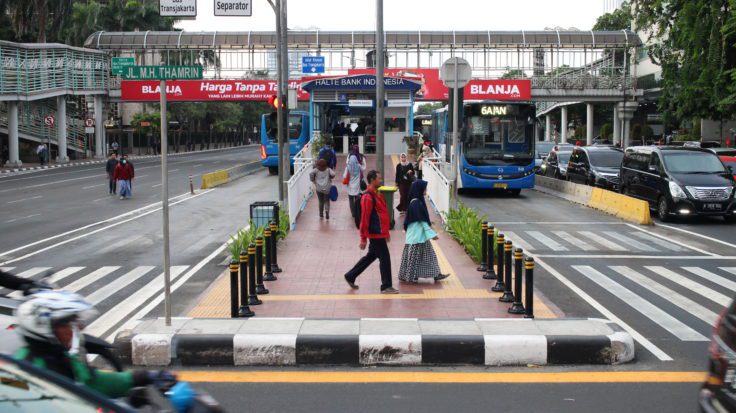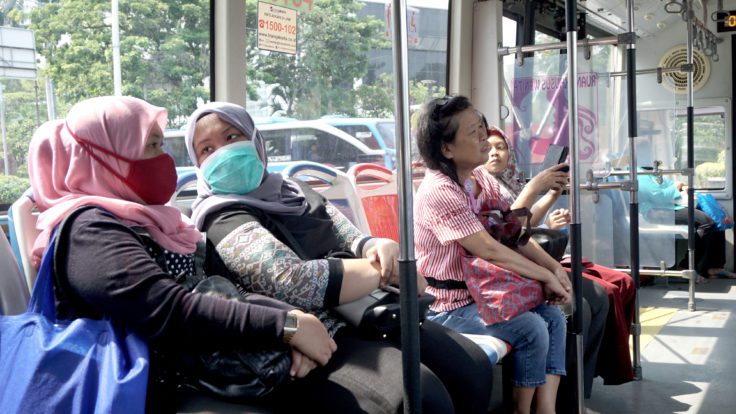On June 13th, 2023, Jakarta’s Transjakarta transport agency reached a significant milestone of serving more than one million passengers in one day, made possible through the combined efforts of its various systems, including Bus Rapid Transit (BRT), micro-transit, and other non-BRT services provided by the agency. This significant rider growth—particularly following the decline caused by the pandemic—was made possible by the city’s recent efforts to enhance Transjakarta services and facilities, including the revitalization of BRT stations, integration with walking and cycling networks, a focus on accessibility, and a transition to electric buses. Transjakarta’s popularity has helped transform Jakarta into a less car reliant city.
ITDP Indonesia has been collaborating with the Provincial Government of DKI Jakarta since 2000, providing transport officials with technical expertise, direct advocacy, and policy guidance to help the region mitigate the impacts of urban transport emissions, improve air quality, and create more livable and equitable communities. Transjakarta serves as an example both within the region and worldwide. It demonstrates how thoughtful planning can lead to high quality and popular public transportation.

Integration
One of the reasons Transjakarta has grown so much is that it has integrated with bus and paratransit operators, allowing it to serve a larger region and diverse areas, otherwise not accessible with a large bus. Transjakarta has integrated with medium sized bus operators, small bus operators, and LRT (Light rail transit). The integration has allowed Transjakarta to take over routes, which has given customers continuity in their commutes and travel patterns.
Features for a comfortable ride
One particularly consequential result of the integration are the improvements in service among transit operators integrated with Transjakarta. Right now, the small and medium bus operators integrated with Transjakarta follow the Transjakarta Minimum Service Standards (MSS), which prohibits smoking on board, and requires that drivers follow speed regulations and stop at designated locations, among other enforced rules. These rules are enforced through fines and are successful in limiting or diminishing such problematic behavior. Each Transjakarta vehicle is equipped with air conditioning and special designated areas for elderly, pregnant women, and disabled people as well as spaces for women to sit to avoid harassment. Passengers have learned to utilize these areas appropriately.

Transjakarta has importantly remained low cost, with the price of each ticket at 3500 Rp (roughly $.30 USD) including transfers, thanks to its integration. There are no weekly or monthly passes offered but each ride costs the same, irrespective of distance or zone. Many of the important features added to Transjakarta’s system like having dedicated bus lanes and off-board fare purchasing have increased efficiency and thus reliability. Passengers have adapted to new features like having to purchase tickets in advance. There is a mobile application that is available for free to all passengers, giving them access to departure and arrival times.
What’s next?
With the one million passengers record, these strategies are demonstrating success. Now the region is working to advance the full-scale electrification of its public bus system, which includes a recent pilot deploying 100 e-buses and a commitment to stop procuring conventional fossil fuel buses by 2025. A landmark report from ITDP Indonesia and UK PACT, A Business Case of Transjakarta’s First Phase E-Bus Deployment, finds that the large-scale electrification of Transjakarta is not just financially feasible, but offers significant climate, economic, and social benefits.
The report’s recommendations and guidance provides a strategic foundation for the Government of Jakarta to achieve its electrification targets by 2030, focusing on the key areas of capacity building, financial planning, and policy development. It is projected that the full-scale electrification of Transjakarta’s bus fleet by 2030 can generate a net economic and social benefit of IDR 4.2 trillion (nearly $280 million USD) cumulatively, while reducing nearly 60 percent of GHG emissions compared to a Business-as-Usual (BaU) scenario.
In addition to putting forth a business case for electrification, exploring financing scenarios, and presenting a regulatory framework, the report also gives priority to Gender Equality and Social Inclusion (GESI) strategies as a pillar of the transition. The focus of GESI is to improve Transjakarta’s gender responsiveness and accessibility measures throughout the planning and implementation phases, with a particular focus on people with disabilities, women, and other often marginalized groups. Such considerations are critical to ensuring that the future of Transjakarta’s services are not just sustainable, but also inclusive and reflective of all of its user groups.

